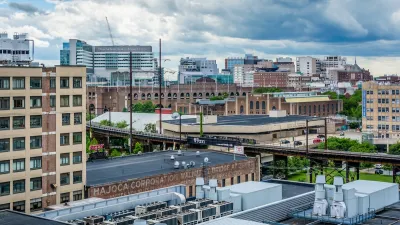The increasing recognition of waterfronts as a recreational and redevelopment asset belies its continued value for trade and industry. Will Doig makes the case for the oft-antagonized shipping industry in the tug-of-war over waterfront real estate.
Often described as a public asset, the waterfront has a way of captivating the public imagination, inviting frequent controversies over who gets to develop on it, and what.
Consider, for example, the case of two deep-water berths in Providence, Rhode Island that were sold to a metal recycling company late last year. The "battle [had] been raging in Providence for several years," Doig reports – "on one side, a developer who wanted to turn the shoreline into apartments, offices and hotels. On the other, the maritime industries that have been working there since the turn of last century." Shortly after industry won out, the complaints started rolling in: "Who put this big, ugly heap of metal on our lovely industrial port?"
Doig points out that the reality of waterfront industry stands sharply at odds with the imagined nostalgia of old-time working docks often invoked by many developers and "seen as a way to lure high-earning residents."
But while the shipping industry is soaring – "the container trade has doubled since 2000, and 2012 is expected to be another record-breaking year" – the benefit of booming real estate developments tends to be much shorter-lived. Take New Jersey's "Gold Coast," where in the 1980s, new residents lawyered the scrapyard and repair docks out of town, only for the real estate market to slump not too long thereafter.
Doig highlights a number of advantages that a working waterfront offers: high-paying, blue-collar jobs; environmentally cleaner shipping than trucks or trains; and a more diverse urban economy.
FULL STORY: On the waterfront, the battle rages on

Alabama: Trump Terminates Settlements for Black Communities Harmed By Raw Sewage
Trump deemed the landmark civil rights agreement “illegal DEI and environmental justice policy.”

Planetizen Federal Action Tracker
A weekly monitor of how Trump’s orders and actions are impacting planners and planning in America.

Why Should We Subsidize Public Transportation?
Many public transit agencies face financial stress due to rising costs, declining fare revenue, and declining subsidies. Transit advocates must provide a strong business case for increasing public transit funding.

Understanding Road Diets
An explainer from Momentum highlights the advantages of reducing vehicle lanes in favor of more bike, transit, and pedestrian infrastructure.

New California Law Regulates Warehouse Pollution
A new law tightens building and emissions regulations for large distribution warehouses to mitigate air pollution and traffic in surrounding communities.

Phoenix Announces Opening Date for Light Rail Extension
The South Central extension will connect South Phoenix to downtown and other major hubs starting on June 7.
Urban Design for Planners 1: Software Tools
This six-course series explores essential urban design concepts using open source software and equips planners with the tools they need to participate fully in the urban design process.
Planning for Universal Design
Learn the tools for implementing Universal Design in planning regulations.
Caltrans
Smith Gee Studio
Institute for Housing and Urban Development Studies (IHS)
City of Grandview
Harvard GSD Executive Education
Toledo-Lucas County Plan Commissions
Salt Lake City
NYU Wagner Graduate School of Public Service





























